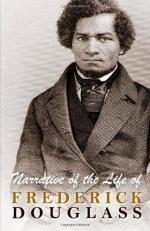I found employment, the third day after my arrival, in stowing a sloop with a load of oil. It was new, dirty, and hard work for me; but I went at it with a glad heart and a willing hand. I was now my own master. It was a happy moment, the rapture of which can be understood only by those who have been slaves. It was the first work, the reward of which was to be entirely my own. There was no Master Hugh standing ready, the moment I earned the money, to rob me of it. I worked that day with a pleasure I had never before experienced. I was at work for myself and newly-married wife. It was to me the starting-point of a new existence. When I got through with that job, I went in pursuit of a job of calking; but such was the strength of prejudice against color, among the white calkers, that they refused to work with me, and of course I could get no employment.*
* I am told that colored
persons can now get employment at
calking in New Bedford—a
result of anti-slavery effort.
Finding my trade of no immediate benefit, I threw off my calking habiliments, and prepared myself to do any kind of work I could get to do. Mr. Johnson kindly let me have his wood-horse and saw, and I very soon found myself a plenty of work. There was no work too hard—none too dirty. I was ready to saw wood, shovel coal, carry wood, sweep the chimney, or roll oil casks,—all of which I did for nearly three years in New Bedford, before I became known to the anti-slavery world.
In about four months after I went to New Bedford, there came a young man to me, and inquired if I did not wish to take the “Liberator.” I told him I did; but, just having made my escape from slavery, I remarked that I was unable to pay for it then. I, however, finally became a subscriber to it. The paper came, and I read it from week to week with such feelings as it would be quite idle for me to attempt to describe. The paper became my meat and my drink. My soul was set all on fire. Its sympathy for my brethren in bonds—its scathing denunciations of slaveholders—its faithful exposures of slavery—and its powerful attacks upon the upholders of the institution—sent a thrill of joy through my soul, such as I had never felt before!




